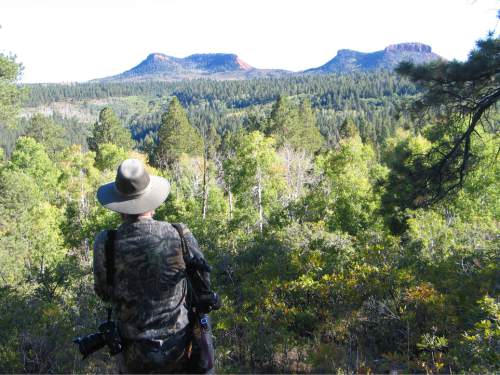This is an archived article that was published on sltrib.com in 2016, and information in the article may be outdated. It is provided only for personal research purposes and may not be reprinted.
Washington • The U.S. Senate on Tuesday knocked down an attempt by Sen. Mike Lee to limit a president's ability to name new national monuments without the consent of Congress and the state in which the protection is sought.
The Utah Republican's amendment would have allowed a president to name a monument — such as the proposed Bears Ears National Monument in Utah — but such a designation would expire within three years if Congress and the state in which the monument was located didn't pass resolutions supporting the move.
Lee's amendment failed in a near-party-line vote, 47-48, with Democrats charging that it was an attempt to "effectively end" monument designations.
"The Antiquities Act is really one of our nation's most successful conservation laws," said Sen. Maria Cantwell, D-Wash., noting that half the national parks began as monuments.
Lee said his amendment was about rebuilding trust with the Americans, especially those communities affected by federal-land-management decisions.
On the Senate floor, Lee cited President Bill Clinton's designation of the Grand Staircase-Escalante National Monument in Utah in 1996 and how it surprised state officials who were told only a day before the announcement.
"For most people, the Grand Staircase episode is a case study in government-sponsored injustice and bureaucratic tyranny," Lee said Tuesday. "For me, it brings to mind the line from America's Declaration of Independence, in which the colonists charge that the King of Great Britain 'has erected a multitude of New Offices, and sent hither swarms of Officers to harass our people, and eat out their substance.' But for President [Barack] Obama — and for the radical environmental groups that have co-opted federal land-management agencies — it is the textbook model for the application of the Antiquities Act."
Several attempts have been made in recent years to curtail the president's ability to name monuments unilaterally with legislation aimed at carving out certain states or limiting the size or location of the designations.
Wyoming and Alaska are exempted from the Antiquities Act.
Obama has said he will continue to use his power under the Antiquities Act. In 2014, he noted he'd set aside more than 3 million acres of public land — adding "and I am not finished."
A group of tribal nations has petitioned the White House to name 1.9 million acres in southeastern Utah as the Bears Ears National Monument to preserve cultural and ancestral areas.
Lee noted that request in pushing his amendment, arguing there are groups of Native Americans who don't agree with a new monument.
"The president of the United States has no business," Lee said, "seizing vast stretches of public land to be micromanaged — and mismanaged — by federal agencies, especially if the people who live, work and depend on the land stand in opposition to such a takeover."
Environmentalists said Lee's move was just another attempt to undermine the Antiquities Act.
"The whole purpose of the Antiquities Act is to allow the president to take swift, decisive action to protect irreplaceable landscapes when Congress is unable or, in many cases, unwilling to do so," said Jordan Giaconia, a legislative assistant to the Southern Utah Wilderness Alliance's Washington office. "Need we remind them that Arches, Bryce and Zion national parks, three of Utah's most beloved and widely visited destinations, all began as monuments?"
Four Republicans joined Democrats in defeating Lee's proposal. Sen. Orrin Hatch, R-Utah, supported his colleague's amendment.



